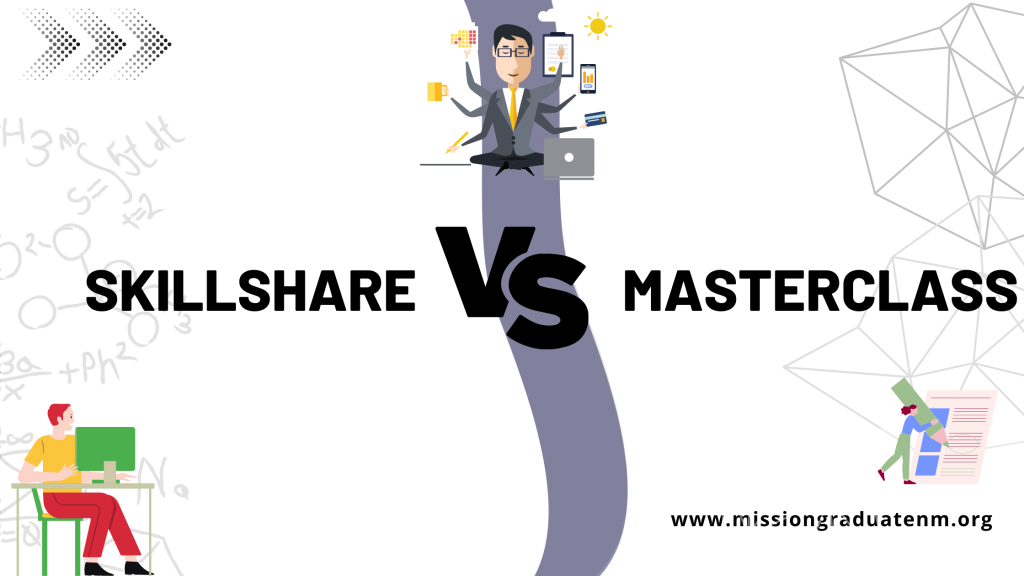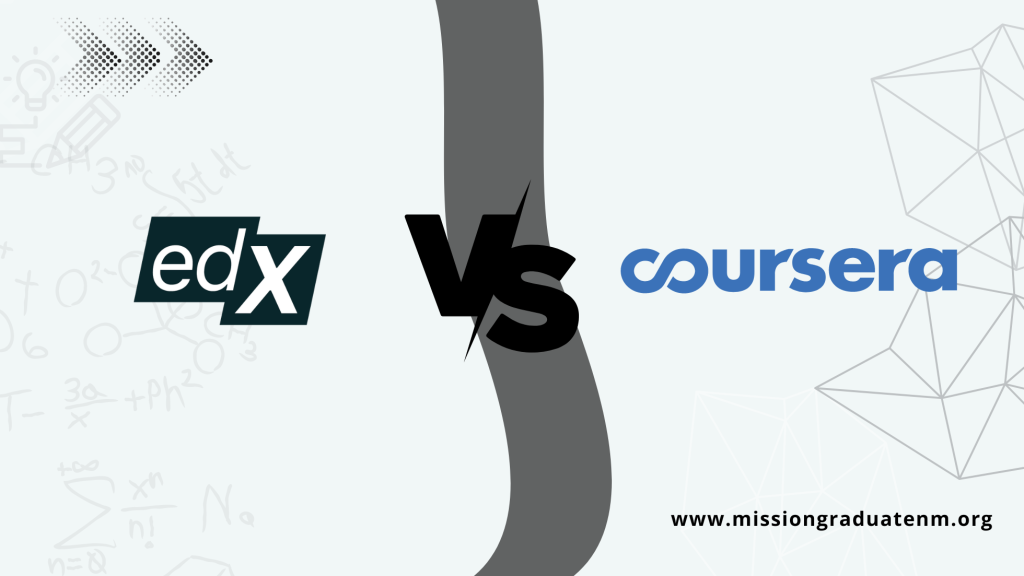When deciding between DataCamp vs Coursera for your online learning needs, it’s important to consider your specific learning goals.
If you’re primarily focused on Data Science and need hands-on experience with coding, DataCamp offers a highly focused and interactive platform.
However, if you’re looking for a broader range of subjects, including accredited degrees and university-backed certificates, Coursera is the better choice.
In this comparison, I will help you explore the key features, pricing, and target audiences for both platforms, helping you make an informed decision based on your learning preferences.
DataCamp vs Coursera: Quick Overview
For Data Science courses, DataCamp is the best option. On the other hand, if you want different subject courses that offer university-level certificates, go for Coursera.
The following table briefly provides an overview and a general comparison of DataCamp vs. Coursera.
| Features | DataCamp | Coursera |
| 7-day Free trial | ✔️ | ✔️ |
| Free courses | 32 | 6156 |
| Premium Membership | $13 per month billed annually | $33 per month billed annually |
| Course Level | Beginner to Advanced | Beginner to Advanced |
| Certificate | ✔️ | ✔️ |
| Specializations | ❌ | ✔️ |
| Degree courses | ❌ | ✔️ |
| University/College credits | ❌ | ✔️ |
| No of subjects taught | 3 | 11 |
| G2 Ratings | 4.6/5 | 4.5/5 |
| Apply | Link | Link |
Who is DataCamp Right For?
- Aspiring data scientists and analysts
- Complete beginners in programming
- Busy professionals needing quick skills
- Students supplementing formal education
- Business analysts learning data tools
Who is Coursera Right For?
- Students seeking accredited online degrees
- Professionals wanting in-depth specializations
- Self-paced traditional academic learners
- Career changers pursuing industry certificates
- Lifelong learners across various subjects
Getting to Know DataCamp and Coursera
Here is the basic but important information about DataCamp and Coursera, just in case you don’t know what they are.
What Is DataCamp?
DataCamp is an online training platform for students who want personalized data-related training.
The platform was launched in 2013, and it has become one of the most thriving online learning platforms, with more than 13 million students worldwide.
DataCamp has an online presence in more than 180 countries and has more than 2000 partner educational organizations and companies.
DataCamp teaches individuals and has programs for companies that want to train their staff. For example, companies like Google, Uber, Deloitte, Paypal, eBay, and Microsoft have trained their teams through resources on DataCamp.
Learn more about the platform with our detailed Datacamp review.
DataCamp Pros
- Easy to use with a learn-by-doing approach
- Offers high-quality learning content
- Gamified learning and in-browser coding experience
- Cost-efficient with transparent pricing
- Suitable for learners ranging from beginner to advanced
DataCamp Cons
- No accredited certificates
- Limited free content
- Focus primarily on Data Science
What Is Coursera?
Coursera is an E-learning platform that provides easy access to numerous courses and degrees from world-class universities and leading companies.
Coursera was established in 2012 and partners with Stanford University, the University of Michigan, and 325+ others.

Coursera offers over 13,391 courses in the catalog, divided into eleven subjects ranging from Data Science to Arts and Humanities.
In addition to that, it also has hundreds of free courses, and you can get started with a 7-day free trial.
Bonus: If you want to know more about Coursera. Check our detailed Coursera Review here.
Coursera Pros
- Offers professional, high-quality service.
- University-level content taught.
- Wide range of learning options available.
- You can get a complete degree online.
- Accredited certificates.
- Provides financial aid.
Coursera Cons
- Does not have a fixed pricing structure for all offerings.
DataCamp vs Coursera Comparison
Both platforms offer courses in various subjects, including data science.
By comparing factors such as target audience, ease of navigation, course content, instructor quality, and pricing, you can determine which learning platform best suits your learning preferences, aims, and budget.
1. Target Audience
Despite being online training platforms, DataCamp and Coursera have different student strongholds. Both platforms’ target audiences overlap and diverge.
Who Should Go For DataCamp?
- Beginner in Data Science and wants to learn the basics.
- Looking for cheap data science courses.
Who Should Go For Coursera?
- Intermediate and advanced learners who want to explore multiple courses, not just data science.
- Learners who want to learn from a formal university and experienced instructors from the top universities.
- Professionals and students who want to get a certificate from an accredited institution.
2. Ease of Use
Well-designed graphics and visuals can make it easy to find the information you need, navigate the platform, and complete the task.
Let’s compare the ease of navigation in DataCamp vs. Coursera.
DataCamp
DataCamp courses are highly mobile-compatible. The site itself is easy to navigate, and since DataCamp mainly offers programming and coding-related courses, laptops and computers are best suited for learning.
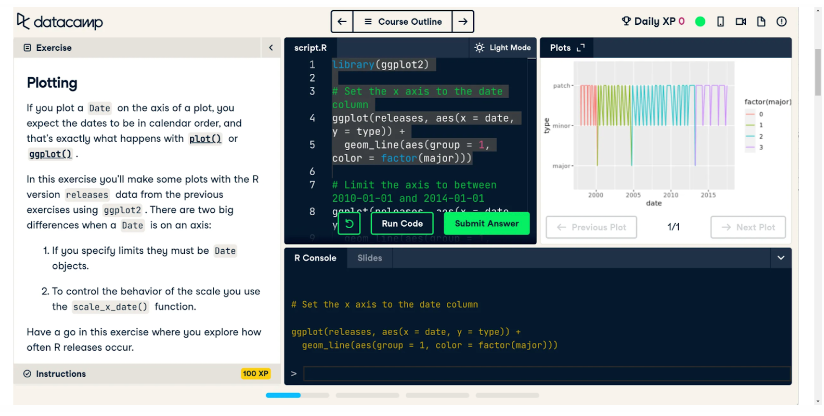
The graphics used on the site and in lectures increase engagement. The DataCamp lectures have gamified the learning process.
A DataCamp user shared how helpful the interface is. This is what they have said.
“The site’s interface is friendly and uncomplicated, and any beginner on the site can handle it without much difficulty. There is also good guidance for beginners on the site, which makes it easy for them to browse and explore the site.”
Abdalrahman Hassan, DataCamp user
Source: Trustpilot
Coursera
Like DataCamp, Coursera is highly mobile-compatible. Its extensive course catalog can be overwhelming, but it offers many subjects.
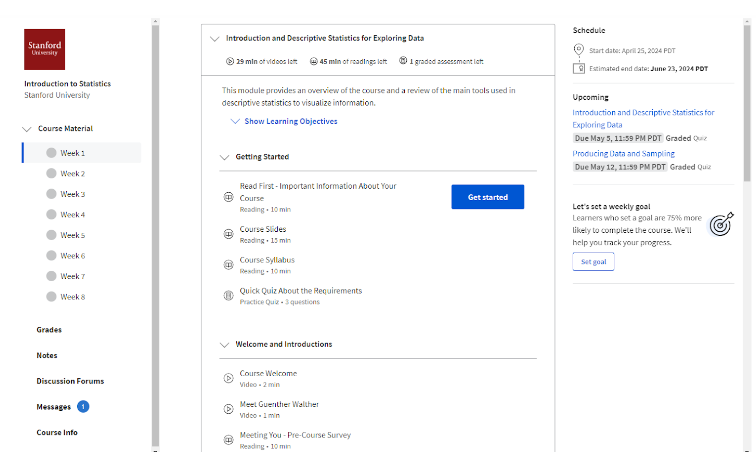
Coursera uses simple graphics, which is much more convenient for users. One Coursera user shared their experience with the interface and ease of navigation.
“It is easy to use and search for your topic of interest. I use it on a weekly basis since I have a lot to learn. It is easy to implement and share any recommended topic with others.”
Monaliza B., Coursera user
Source: G2
3. Language Support
Language support services like translation, voiceover, localization, and subtitling are vital because they help online learning platforms overcome substantial language barriers, making educational content widely accessible.
DataCamp
Although the DataCamp website is in English, the course videos have subtitles in at least ten languages. Although English is the basic language used to teach, DataCamp provides community-based resources in multiple languages.
Coursera
Coursera courses primarily teach in English but use translated content and subtitles. Currently, Coursera offers courses in 18 languages, including French, Mexican, Chinese, Thai, etc.
4. Course Quality And Diversity
DataCamp offers courses primarily centered around data science and coding. In contrast, Coursera offers courses across multiple disciplines, offering depth and breadth in subjects such as technology, business, arts, and humanities.
DataCamp Courses and Career Tracks
DataCamp provides 480 courses, 64 skill tracks, and 19 career tracks. The skill tracks teach you how a particular programming language and tool works.
Similar to the skill track, the career paths aim to prepare you for the data science field.
Best DataCamp Career Tracks:
Learning through DataCamp courses can lead to Professional careers such as data scientist, business intelligence analyst, data engineer, marketing analytics manager, financial analyst, and data visualization engineer.
DataCamp Free Courses
DataCamp does not offer free courses, but the Basic subscription plan allows you to view the first chapter of each course. This is a great way to determine the best learning paths to improve your knowledge and career prospects.
As much as the Basic plan is excellent for learners, the free access is limited and will not provide as much value as other plans.
DataCamp Certifications
DataCamp offers certificates after completing courses such as Introduction to Data Analysis. These certificates are not accredited but are substantial proof of skill.
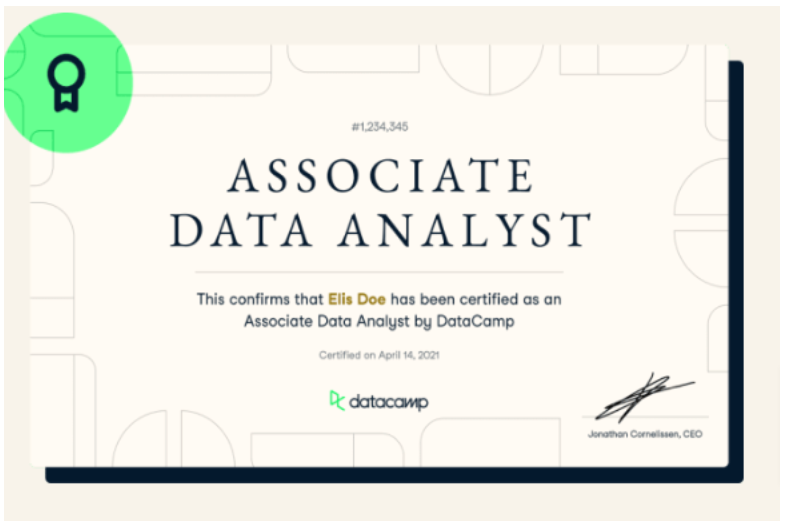
DataCamp Certifications are another category that provides certifications for more comprehensive learning paths.
Coursera Courses and Career Tracks
Coursera offers regular courses, online degrees, and specializations.
Its extensive catalog includes courses in different fields, such as Business, Data Science, Information Technology, Arts and Humanities, Health, Mathematics, Physical Science, Engineering, Social Science, and Language learning.
Coursera launched Career Learning Paths in 2020. A Career Learning Path is free online material that helps you find the learning content you need to reach your professional goals.
Coursera offers six high-growth Career Learning Paths for Digital Marketing, Agile Project Management, Data Engineering, Design, Network Engineering, and Data Science.
Coursera Free Courses
There are about 2,270 free courses available on Coursera for you to upskill. However, like any free online course, you have to work to meet your educational needs.
One thing you need to keep in mind is that many free Coursera courses do not offer certificates.
Best Free Coursera Courses:
- Introduction to Statistics by Stanford University: This beginner-level free online course requires about 14 hours to complete. It will teach you statistical concepts that are important for learning from a data and communication point of view.
Course link: Here
- Learn to Program—The Fundamentals: This is a 25-hour course for newbies. It covers Python syntax and semantics, computer programming, and more.
Course link: Here
- Computer Science-Programming with a Purpose: This beginner-level course needs 88 hours to complete. Through this course, you’ll learn programming principles, java programming, and algorithms.
Course link: Here
Coursera Certifications
Coursera offers accredited certificates for its courses, specializations, and degrees. You’ll receive an official certificate after you finish the course. Here’s an example of how the Tools for Data Science certificate looks.
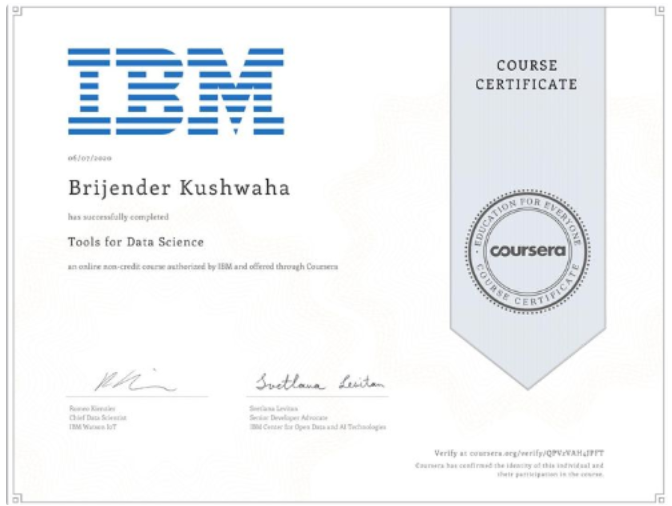
Coursera also provides professional certificates after completing the Professional Certificate Program. These programs are composed of a series of related courses that involve assignments and projects.
5. Instructors
Both platforms have highly trained expert course instructors. The major distinction is that the DataCamp has industry teachers, whereas university professors teach Coursera courses.
DataCamp
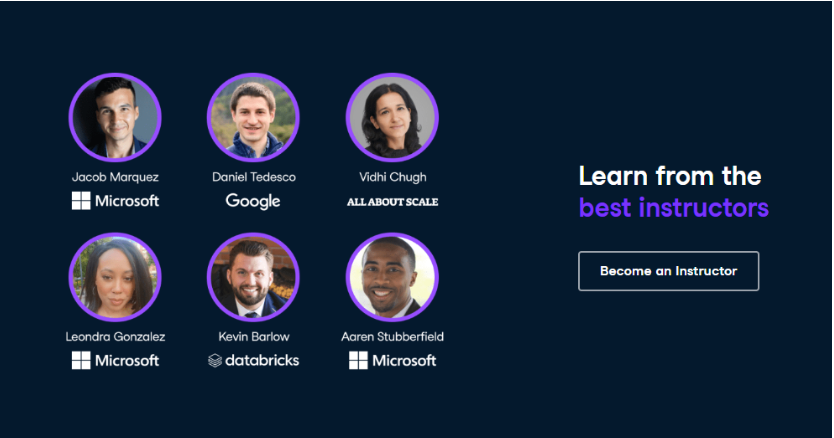
The DataCamp has more than 400 instructors and industry-leading experts. Each instructor has a bio with a short paragraph about the instructor’s background. This bio also has links to other courses they teach.
Coursera
Coursera instructors come from famous universities like Yale, Michigan, and Stanford, as well as leading companies like Google and IBM. Like DataCamp, Coursera provides a brief bio and credentials, including experience and degrees.
6. Pricing
The main concern for many is the comparison of the pricing structures of DataCamp and Coursera.
Explore how their subscription models and course offerings align with individual financial needs and learning objectives.
DataCamp Pricing
DataCamp offers a more flexible, cheap option for full-time programs.
| Feature | Basic | Premium | Teams |
| Pricing | $0 | $13 per month billed annually | $25 per user per month billed annually |
| Access to full course library | ❌ | ✔️ | ✔️ |
| Community support | ❌ | ✔️ | ✔️ |
| All courses | ❌ | ✔️ | ✔️ |
| Quizzes | ❌ | ✔️ | ✔️ |
| Personalized practice | Limited | Unlimited | Unlimited |
| Skill paths | ❌ | ✔️ | ✔️ |
| Real-world project | Limited | Unlimited | Unlimited |
| Certificates | ❌ | ✔️ | ✔️ |
| Career paths | ❌ | ✔️ | ✔️ |
DataCamp Discounts
DataCamp keeps offering discounts throughout the year. Right now, the active discounts you can get are:
- DataCamp Student Discount
Offers a total of 50% off, especially for students. For more information, check our page here.
- Save on annual subscription plans:
Save up to 75% off yearly subscriptions to Learn Premium, Workspace Premium, and Recruit Pro plans.
- DataCamp Classrooms:
The best deal, and my favorite, is the DataCamp 6-month free subscription for teachers and students, which can be renewed indefinitely.
DataCamp Refunds
It is crucial to note that DataCamp doesn’t offer refunds. DataCamp has an auto-renewal subscription policy that mechanically renews your membership. The good thing is that you can cancel your subscription at any time.
You can ask for a refund within 14 days of your purchase if you want a refund.
Coursera Pricing
Coursera courses have two pricing options: single payment and subscription.
a. Single payment
The single payment for courses, certificates, and specialization courses starts at $49. You can also try the course for free for seven days to see if you like it.
The prices for a Degree can range from $9,000 to $50,000, while for MasterTrack courses, they start at $2,000.
b. Subscriptions
The major subscription-based model is Coursera Plus. Coursera Plus gives unrestricted access to almost 90% of the Coursera course catalog, and you can earn a certificate for every successfully completed course.
The following table shows the Coursera Plus price billed monthly and annually.
| Coursera Plus (Monthly) | Coursera Plus (Annually) |
| $59 | $399 |
Some specialization courses offer subscriptions, charging learners monthly until they complete the course (e.g., the Digital Marketing Specialization Course).
| Guided Projects | Courses | Certificate Courses | Specialization | MasterTrack Program | Degree |
| From $9.99 | From $49 | From $49 | From $49 | From $2,000 | From $9,000 |
Looking at these tables, it seems courses aren’t as cheap as we think. On the other hand, it’s not every day that we get to learn from professionals, industry specialists, and university professors.
Coursera Discounts
The best part about Coursera is that you can pay less and learn more using these tips.
- 7-day Free Trial
Subscribe for the 7-day free trial; anything and everything you learn during this period will not be charged. Even the certificate you earn during your free trial will be valid.
- Financial Aid Coursera
If you can not afford the Coursera fees, then you can apply for financial aid on Coursera by writing a simple application. This noble initiative by Coursera will help you take a course for free or for less.
Coursera Refunds
During a free trial, no payments are to be refunded, but the refund option differs for other modes.
Here’s the brief information on the refund policy for courses, specializations, and subscriptions.
- Course Certificates:
You can ask for a refund within two weeks of payment.
- Specialization:
The refund policy applies to each course payment. If you pre-pay for a Specialization, you can request a complete refund up to two weeks after your payment date.
If you opt for specialization with a free trial, you can not get a refund for the subscription payment after the free trial ends.
- Subscription:
If you don’t want to pay for a subscription anymore, you can cancel the subscription.
You can also request a Coursera Plus subscription refund within two weeks of payment. But remember, Coursera doesn’t offer refunds on Guided projects.
7. DataCamp vs Coursera for Data Science
DataCamp’s data science courses are highly specialized. They focus on practical coding skills, which is ideal for those looking to become proficient in specific data analysis techniques.
In contrast, Coursera’s data science courses offer a wide range of options encompassing theoretical concepts and their practical applications.
DataCamp for Data Science
DataCamp is an outstanding platform for learning Data Science and Analytics. It offers student-friendly material, an interactive code editor, and skill and career tracks, which will help you start a journey even without experience.
DataCamp is well-known for its Data Science courses.
Best Data Science Courses on DataCamp
- Data Analyst with R: In this beginner-friendly course, you’ll learn about the basics of data science.
Course link: Here
- Data Scientist in Python: This career track has 29 courses that impart all the information on data science in a single place.
Course link: Here
- Data Analyst with Python: This is a career track with 16 courses. This course will teach you to import, manipulate, clean, and visualize data.
Course link: Here
Coursera for Data Science
Coursera offers about 2423 courses for Data Science students. Even entry-level learners can access these courses.
Best Data Science Courses On Coursera
- IBM Data Science Professional Certificate: This certificate is for anyone wanting to start a data science career.
Course link: Here
- Applied Data Science with Python Specialization: This course will introduce you to Python libraries, like matplotlib, pandas, sci-kit-learn, network, and nltk.
Course link: Here
- Data Science Specialization: This high-rated course has a separate Statistics section. This program offers industry-oriented experience.
Course link: Here
DataCamp vs Coursera Comparison Summary
DataCamp and Coursera each have clear-cut benefits depending on your learning needs.
| Comparison Parameters | DataCamp | Coursera |
| Ease of use | ⭐⭐⭐⭐ | ⭐⭐⭐⭐ |
| Language support | ⭐⭐ | ⭐⭐⭐⭐ |
| Course quality and variety | ⭐⭐⭐⭐ | ⭐⭐⭐⭐ |
| Instructors | ⭐⭐⭐ | ⭐⭐⭐⭐ |
| Affordability | ⭐⭐⭐⭐ | ⭐⭐ |
I feel DataCamp is best suited for novices in data science who want inexpensive, specialized courses with practical coding skills.
At the same time, Coursera caters to intermediate and advanced learners looking for knowledge across numerous subjects accredited by top universities and industry professionals.
Both platforms provide user-friendly interfaces and navigation systems. DataCamp emphasizes gamified learning experiences, while Coursera offers a large course inventory and simple graphics.
Language support is robust on both platforms, though Coursera offers courses in a broader range of languages.
DataCamp’s pricing structure is flexible and modest if we talk about cost. It offers various discounts but no refunds.
On the other hand, Coursera has single-payment and subscription options. These include Coursera Plus, which provides unlimited access to most courses.
Related Read:
My Verdict: DataCamp Has the Best Data Science Courses.
In conclusion, both DataCamp vs Coursera offer valuable opportunities, but their strengths differ significantly.
DataCamp is best suited for aspiring data scientists, beginners, and professionals who want to upskill in data science quickly and affordably.
On the other hand, Coursera provides a certified range of courses across various fields, with the added benefit of accredited certificates and degree programs for those looking for a more traditional academic experience.
So if you’re aiming for specialized skills or a formal qualification, both platforms have something to offer—it’s all about aligning your educational needs with the right platform.
FAQs
If you’re looking for Data Science courses, DataCamp is the best option, but if you want different subject courses that offer university-level certificates, go for Coursera.
DataCamp offers courses for both beginners and experts. DataCamp courses start with basic coding and gradually become more advanced.
Coursera certificates are highly respected as they have industry-recognized credentials and are accredited by many top-tiered universities.
Coursera is better because it offers courses and certificates created in collaboration with world-renowned universities, such as Stanford, Duke, Illinois, etc.

